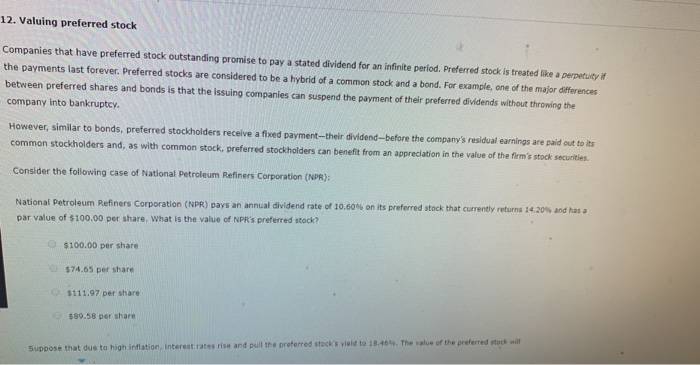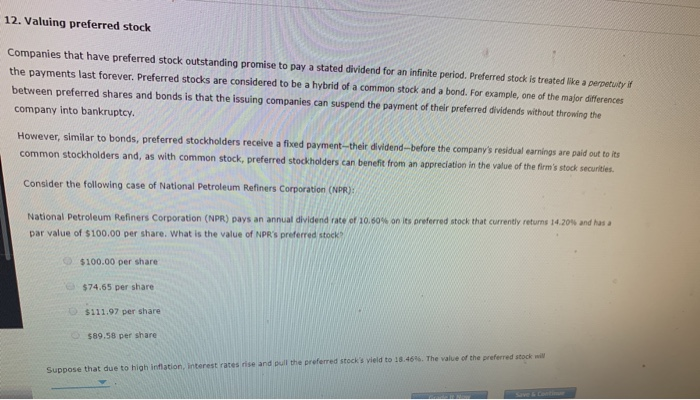12. Valuing preferred stock Companies that have preferred stock outstanding promise to pay a stated dividend for an infinite period. Preferred stock is treated like a perpetuity if the payments last forever. Preferred stocks are considered to be a hybrid of a common stock and a bond. For example, one of the major differences between preferred shares and bonds is that the issuing companies can suspend the payment of their preferred dividends without throwing the company into bankruptcy. However, similar to bonds, preferred stockholders receive a fixed payment--their dividend-before the company's residual earnings are paid out to its common stockholders and, as with common stock, preferred stockholders can benefit from an appreciation in the value of the firm's stock securities. Consider the following case of National Petroleum Refiners Corporation (NPR): National Petroleum Refiners Corporation (NPR) pays an annual dividend rate of 10.60% on its preferred stock that currently returns 14.205 and has a par value of $100.00 per share. What is the value of NPR's preferred stock? $100.00 per share $74.65 per share $111.97 per share $89.58 per share Suppose that due to high inflation, Interest rates rise and pull the preferred stock's yield to 19.469. The value of the preferred stock will 12. Valuing preferred stock Companies that have preferred stock outstanding promise to pay a stated dividend for an infinite period. Preferred stock is treated like a perpetuty i the payments last forever. Preferred stocks are considered to be a hybrid of a common stock and a bond. For example, one of the major differences between preferred shares and bonds is that the issuing companies can suspend the payment of their preferred dividends without throwing the company into bankruptcy. However, similar to bonds, preferred stockholders receive a fixed payment--their dividend--before the company's residual earnings are paid out to its common stockholders and, as with common stock, preferred stockholders can benefit from an appreciation in the value of the firm's stock securities Consider the following case of National Petroleum Refiners Corporation (NPR): National Petroleum Refiners Corporation (NPR) pays an annual dividend rate of 10.60% on its preferred stock that currently returns 14.205 and has a par value of $100.00 per share. What is the value of NPR's preferred stock $100.00 per share $74.65 per share $111.97 per share $89.58 per share Suppose that due to high inflation, interest rates rise and pull the preferred stock's vield to 18.46%. The value of the preferred stock








